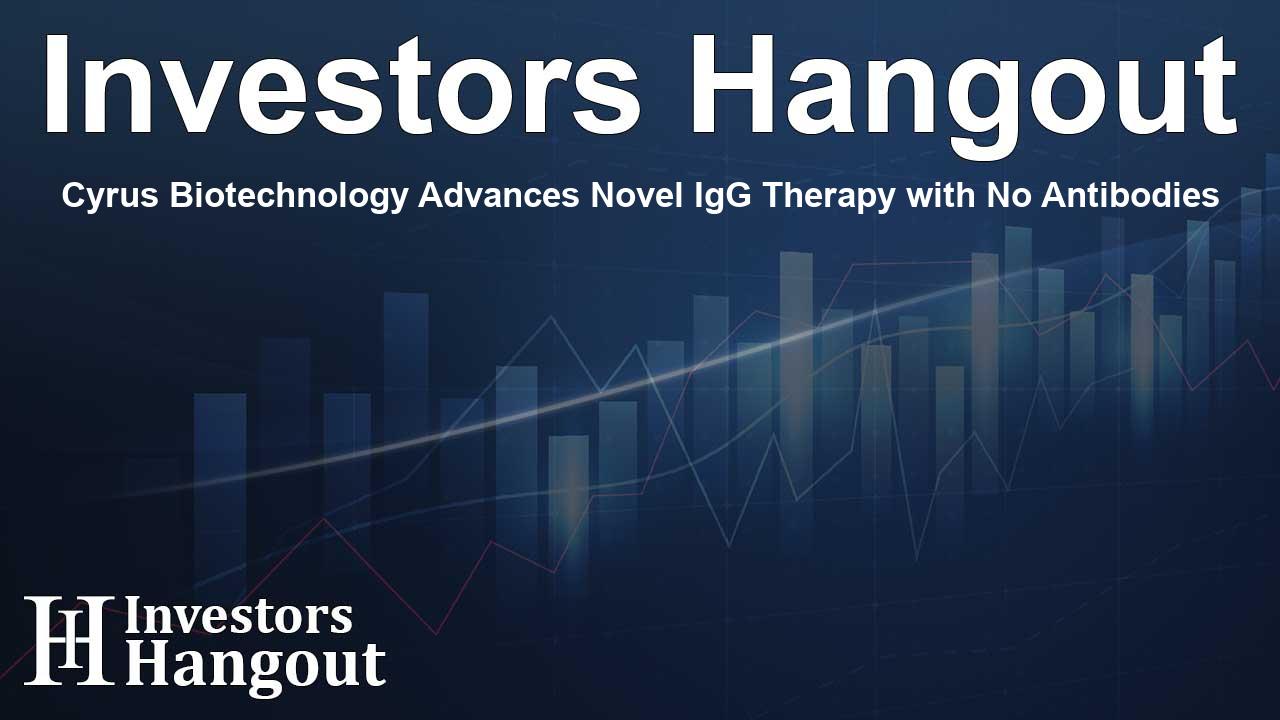Cyrus Biotechnology Advances Novel IgG Therapy with No Antibodies

Promising Developments by Cyrus Biotechnology
Cyrus Biotechnology, Inc. has unveiled groundbreaking data showcasing the effectiveness of its engineered IgG-degrading enzyme, CYR241, in a unique rabbit redosing model. This enzyme demonstrates significant therapeutic activity without the formation of anti-drug antibodies (ADAs) upon repeated administration.
Understanding the Engineered Enzyme
The enzyme IdeS, derived from S. pyogenes, has previously received approval in its wild type form for patients undergoing kidney transplantation. In these cases, the enzyme effectively depletes IgG antibodies, reducing host immune responses against transplant tissues. This strong capability showed great promise during preclinical trials, and IdeS is now under evaluation for various conditions, including anti-GBM disease and Guillan-Barré Syndrome.
However, its application in chronic autoimmune diseases faced challenges due to the enzyme's short half-life and a significant immune response against it. Cyrus Biotechnology has engineered a new version of IdeS with an extended half-life that surprisingly elicits no ADAs in relevant animal models, demonstrating its potential for redosing in clinical applications.
The Study's Findings
CYR241 stands out by not provoking any antibody formation even after the second dose, in stark contrast to the wild type IdeS, which shows a robust ADA response after initial administration. According to their latest findings, the dosage of both WT IdeS and CYR241 was administered on specific intervals in rabbits. The rabbit model is commonly used in pharmacokinetic evaluations due to its similarities to human responses, which assists in understanding enzyme activity and immunogenicity.
Over the course of the study, the WT IdeS enzyme prompted notable IgM and IgG ADA responses shortly after administration, indicating its immunogenic potential. On the other hand, CYR241 maintained efficacy with a marked reduction in IgG levels with both doses administered, highlighting the enzyme’s stability and potency.
Expert Insights on IgG Targeting Strategy
Dr. Tony Manning, a Board Director at Cyrus and a former Chief Scientific Officer at Momenta Therapeutics, stated, “The IdeS enzyme is an ideal candidate for therapies targeting IgG driven diseases, where the anti-FcRn class of drugs has shown efficacy in reducing IgG as a therapeutic approach.” He emphasized that the innovation of creating a redosable Ion with an extended half-life was crucial for advancing treatment options in autoimmune disease management.
CYR241 has been meticulously optimized to avoid neutralizing antibody responses through specific glycosylation adjustments. The reengineering for low MHC binding to mitigate T cell activation utilizes an advanced AI-driven platform, enabling responses to thousands of MHC/peptide interactions for superior results.
Future Directions for Cyrus Biotechnology
As Cyrus Biotechnology prepares to present its findings, the company is set to attend significant conferences, including the 2025 JP Morgan conference and the PepTalk conference in January. These platforms will allow Cyrus to share new insights about its potent enzyme and innovative deimmunization strategies.
About Cyrus Biotechnology
Cyrus Biotechnology is recognized as a pioneering AI-driven therapeutics company focused on developing preclinical-stage biologics aimed primarily at autoimmune conditions. Founded alongside renowned scientist Prof. David Baker, a Nobel Prize winner, Cyrus advances its internal pipeline with a commitment to innovation in cytokine optimization. The company has fostered partnerships with various Pharma firms, enhancing its capabilities in protein design and therapeutics.
With significant backing from lead investor Orbimed and influential partners, Cyrus Biotechnology is well-positioned to tackle pressing medical challenges and enhance therapeutic outcomes.
Frequently Asked Questions
What are the key findings about CYR241?
CYR241 exhibits potent activity without inducing anti-drug antibodies, making it suitable for repeated dosing in autoimmune conditions.
How is CYR241 different from wild type IdeS?
Unlike wild type IdeS, which triggers significant ADA responses, CYR241 remains effective with no immune buildup, enhancing its therapeutic potential.
What implications do these findings have for autoimmune diseases?
The study suggests that CYR241 could offer a new, more effective treatment option for autoimmune diseases where IgG reduction is vital.
What future events will Cyrus Biotechnology attend?
Cyrus will participate in the 2025 JP Morgan conference and the PepTalk conference to discuss insights from their recent studies.
Who co-founded Cyrus Biotechnology?
Prof. David Baker, a 2024 Nobel Prize winner and innovator in protein design, co-founded Cyrus Biotechnology, guiding its mission to develop novel therapeutics.
About The Author
Contact Lucas Young privately here. Or send an email with ATTN: Lucas Young as the subject to contact@investorshangout.com.
About Investors Hangout
Investors Hangout is a leading online stock forum for financial discussion and learning, offering a wide range of free tools and resources. It draws in traders of all levels, who exchange market knowledge, investigate trading tactics, and keep an eye on industry developments in real time. Featuring financial articles, stock message boards, quotes, charts, company profiles, and live news updates. Through cooperative learning and a wealth of informational resources, it helps users from novices creating their first portfolios to experts honing their techniques. Join Investors Hangout today: https://investorshangout.com/
The content of this article is based on factual, publicly available information and does not represent legal, financial, or investment advice. Investors Hangout does not offer financial advice, and the author is not a licensed financial advisor. Consult a qualified advisor before making any financial or investment decisions based on this article. This article should not be considered advice to purchase, sell, or hold any securities or other investments. If any of the material provided here is inaccurate, please contact us for corrections.
